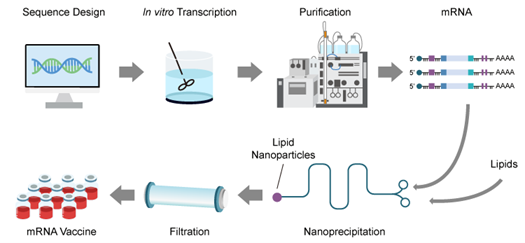The mRNA vaccine is a groundbreaking development in the field of biopharmaceuticals, offering an innovative solution to the global pandemic and potential protection from other infectious diseases. It works by introducing synthesized mRNA molecules into human cells, which then produces proteins that provoke an immune response. First developed in the 1990s by American scientist Jon Wolff, this technology has been validated on a much larger scale following the R&D of the COVID-19 vaccine. This usage has highlighted its potential for further use in biopharmaceuticals and provided evidence of its effectiveness as an immunization method. The mRNA vaccine technology is currently undergoing vast amounts of research with regards to its efficacy in both preventing and treating numerous diseases, making it a rapidly expanding area within modern-day medicine. With considerable investment being made in the continued development of this technology platform, it looks set to revolutionize biopharmaceuticals into something we have yet to comprehend.
mRNA Vaccine Classifications
RNA vaccines are a relatively new development in the field of vaccinology and can be classified into two main types: non-replicating mRNA vaccines and self-amplifying mRNA vaccines. Non-replicating mRNA vaccines are primarily used for tumor vaccines, as they only encode target antigens without replication mechanisms of the virus. On the other hand, self-amplifying mRNA vaccines are used for infectious agents and contain antigens that also include encoding replication mechanisms. The advantage of this type is that it cannot only increase the duration and level of antigen expression, but also enhance the vaccine-induced immune response. In addition, self-amplifying RNA vaccines can induce a stronger immune response than traditional protein or DNA based vaccines due to their higher dose efficiency. This is important because it means that smaller amounts of vaccine can be used to achieve protection against a given pathogen compared to older technologies. Furthermore, mRNA technology allows for rapid development and production of specific targeted therapies by allowing scientists to quickly modify vaccine sequences depending on the disease being targeted. As a result, this makes them an attractive alternative over traditional methods for quickly responding to emerging diseases such as those caused by novel strains of pathogens.
mRNA Vaccine Advantages
One of the greatest advantages of mRNA vaccines is their high level of safety. Unlike other traditional forms of vaccination, mRNA vaccines contain no infectious material or live pathogen, eliminating the risk of contracting any form of illness from them. Additionally, the production process for mRNA vaccines is much simpler than that for other types of vaccines and does not require any vaccine adjuvants, thus reducing the chance of experiencing any side effects related to these substances. Furthermore, due to their double-immunity properties, mRNA vaccines are highly immunogenic and can help reduce the risk of viral infection while simultaneously reducing the ability of viruses to mutate and become resistant to further treatment. This makes them particularly suitable for large-scale production in order to meet increasing demand for global vaccination efforts. Finally, these vaccines are incredibly effective at stimulating an immune response, which helps protect against a wide range of illnesses and offers enhanced protection against more serious conditions such as cancer or HIV/AIDS. All in all, it is clear that mRNA vaccines offer numerous distinct advantages compared with other types of vaccinations, making them one of the most effective and reliable forms available today.
mRNA Vaccine Workflow

IVT mRNA Synthesis | Synbio Technologies
Synbio Technologies provides a comprehensive suite of mRNA services that is unrivaled in the industry. From template synthesis to in vitro transcription of mRNA, Synbio Technologies’ Syno synthesis platform can offer rapid turnaround times and cost-competitive solutions. All transcriptional RNA molecules are synthesized using automated protocols and are rigorously tested for accuracy, stability, and purity. Their high-yield expression systems result in superior performance from cell transfection to protein expression. mRNA products can be used in a variety of applications such as development of nucleic acid vaccines, gene editing, gene function research, gene diagnosis, structure research, and more. As an added benefit, Synbio Technologies’ mRNA services are also compatible with our custom cloning services; customers can order both cloning vectors and mRNA transcripts at the same time for convenient delivery. With our expansive capabilities and flexibility, we provide extraordinary value to our customers by streamlining the entire workflow process from conception to implementation.
Contact us to learn more about our IVT mRNA synthesis services.

